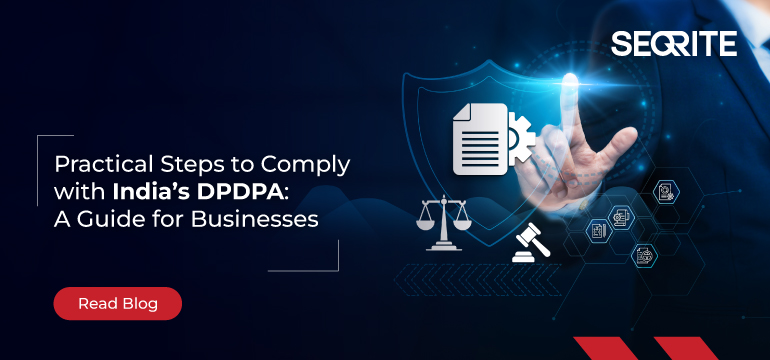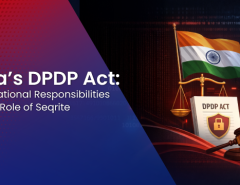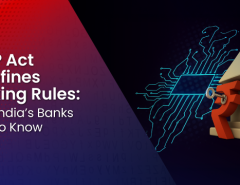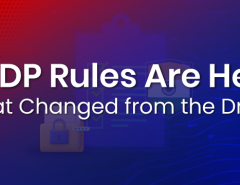The Digital Personal Data Protection Act (DPDPA) is a transformative piece of legislation in India, designed to safeguard personal data and strengthen privacy in an increasingly digital landscape. For organizations handling personal data, compliance with the DPDPA is both a legal obligation and a strategic opportunity to build customer trust. This blog outlines practical steps to achieve DPDPA compliance, drawing on insights from Seqrite’s cybersecurity and data protection expertise.
Understanding the DPDPA
The DPDPA establishes a robust framework for protecting personal data, placing clear responsibilities on organizations, referred to as “Data Fiduciaries.” It emphasizes principles such as transparency, accountability, and informed consent while imposing penalties for non-compliance. Compliance is not just about meeting regulatory requirements—it’s about fostering trust and demonstrating commitment to data privacy.
Strategic Focus Areas for DPDPA Readiness
To align with the DPDPA, organizations must focus on the following core areas:
-
Consent Management:
- Obtain clear, informed, and specific consent from individuals (“Data Principals”) before collecting or processing their data.
- Implement user-friendly consent mechanisms that allow individuals to understand what data is being collected and for what purpose.
- Maintain auditable records of consent to demonstrate compliance during regulatory reviews.
-
Data Minimization and Purpose Limitation:
- Collect only the data necessary for the intended purpose and avoid excessive data collection.
- Ensure data is processed strictly for the purpose for which consent was given, adhering to the DPDPA’s principle of purpose limitation.
-
Data Security and Breach Preparedness:
- Deploy robust cybersecurity measures to protect personal data, including encryption, access controls, and regular security audits.
- Develop an incident response plan to address data breaches promptly and report them to the Data Protection Board of India within the required timeframe.
-
Data Protection Impact Assessments (DPIAs):
- Conduct DPIAs to identify and mitigate risks associated with data processing activities.
- Integrate DPIAs into the planning phase of new projects or systems that handle personal data.
-
Employee Training and Awareness:
- Train employees regularly on DPDPA requirements and cybersecurity best practices, as they are often the first line of defense against data breaches.
- Foster a culture of data protection to ensure compliance across all levels of the organization.
-
Third-Party Vendor Management:
- Ensure third-party vendors handling personal data comply with DPDPA requirements, as Data Fiduciaries are accountable for their vendors’ actions.
- Include clear data protection clauses in vendor contracts and conduct periodic audits of vendor practices.
Practical Steps for DPDPA Compliance
Here are actionable steps organizations can take to achieve and maintain DPDPA compliance:
-
Conduct a Data Inventory:
-
- Using automated tools, discover and classify all personal data collected, stored, and processed across the organization.
- Identify data flows, storage locations, and access points to understand the scope of compliance requirements.
-
Appoint a Data Protection Officer (DPO):
- Designate a DPO as mandated for Significant Data Fiduciaries to oversee DPDPA compliance and engage with regulatory authorities.
- For other organizations, appoint privacy champions across key departments to ensure localized accountability and awareness.
-
Implement Robust Consent Mechanisms:
-
- Designate a DPO as mandated for Significant Data Fiduciaries to oversee DPDPA compliance and engage with regulatory authorities.
- For other organizations, appoint privacy champions across key departments to ensure localized accountability and awareness and user-friendly consent forms that allow individuals to opt in or opt out easily.
- Regularly review and update consent mechanisms to align with evolving DPDPA guidelines.
-
Engage with Legal and Compliance Experts:
-
- Partner with legal professionals to stay updated on DPDPA regulations and interpret its requirements for your industry.
- Seqrite’s advisory services can provide tailored guidance to streamline compliance efforts.
-
Strengthen Cybersecurity Infrastructure:
-
- Deploy advanced cybersecurity solutions to safeguard personal data, such as endpoint protection, threat detection, and data loss prevention tools.
- Seqrite’s suite of cybersecurity products, including endpoint security and data encryption solutions, can help organizations meet DPDPA’s security standards.
-
Develop a Data Breach Response Plan:
-
- Create a comprehensive plan outlining steps to detect, contain, and report data breaches.
- Conduct regular drills to ensure your team is prepared to respond effectively.
Why DPDPA Compliance Matters
Compliance with the DPDPA is more than a regulatory checkbox—it’s a competitive advantage. Non-compliance can result in significant fines and reputational damage, while proactive adherence builds customer trust and strengthens brand credibility. In today’s data-driven economy, prioritizing data protection is a strategic move that sets organizations apart.
How Seqrite Can Help
Seqrite, a cybersecurity and data protection leader, offers a comprehensive suite of solutions to support DPDPA compliance. From endpoint security to data encryption and threat intelligence, Seqrite’s tools are designed to protect sensitive data and ensure regulatory adherence. Additionally, Seqrite’s expert resources and advisory services empower organizations to navigate the complexities of data protection confidently.
Conclusion
The DPDPA is a critical step toward protecting personal data in India, and compliance is a shared responsibility for all organizations. Businesses can align with the law and build trust by implementing practical measures like consent management, robust cybersecurity, and employee training. With Seqrite’s cybersecurity expertise and solutions, organizations can confidently meet DPDPA requirements while safeguarding their data and reputation.
For more information on how Seqrite can help you achieve DPDPA compliance, visit our website.




